A report reveals that approximately 45% of users perform Google searches for online shopping to buy their desired products. So, if you own an eCommerce business, make sure your website appears in search engine result pages (SERPs). If not, you should focus on eCommerce keyword research. It helps you shortlist the relevant keywords and target them with the right strategy to get the desired outcomes.
You need to keep in mind that keyword research has the capability to make or break your online marketing strategy. Therefore, chalking out a custom keyword strategy tailored to match your eCommerce store is necessary in today’s time.
In this blog, we will discuss the top keyword research for eCommerce strategies you can implement directly into your marketing efforts. It provides numerous benefits such as boosting market share and organic revenue, beating the competition, and more.
What is Keyword Research for eCommerce?
Keyword research for eCommerce is the process of checking various terms potential customers use when searching for products online. It enables eCommerce owners to optimize everything be it category pages, product listings, or content appearing in search results. It eventually boosts traffic.
Once you get a complete understanding of popular keywords, you can sketch out the result-driven search engine optimization strategies to magnify visibility and sales. To do it conveniently, you can leverage many important eCommerce keyword research tools such as SEMrush, Ahrefs, Keyword Planner, and more. Some of them are free whereas others are paid keyword research tools.
Effective keyword research allows shoppers to connect with the best products. It improves user experience and conversion rates in today’s highly competitive online marketplace.
Why eCommerce Keyword Research is Important?
eCommerce keyword overview allows your product pages to appear in Google and other search engines to maximize organic traffic, right from scratch. So, the increased traffic converts to more sales. Proper keyword research lets you avail of the following important advantages;
- Get Competitive Edge
A thorough eCommerce keyword research lets you grab opportunities to stay ahead of the competition. It facilitates you to find out various search terms your competitors might miss to rank for to grab those of many untapped market opportunities.
- Boost Market Share
With keyword research, you can discover relevant search terms your competitors use to rank for. So, it gives your ideas about capturing traffic from your competitors.
- Optimize Advertising Spend
With keyword research, you can also grab various opportunities to find low-competition keywords. It helps you run your search ads to lower advertising costs.
- Redefine User Experience
You need to know why people search for keywords and thus tailor your content and also product offerings to match keyword intent. In this way, website visitors find the things they are looking for and also have a good user experience.
Things to Look for in eCommerce Keywords
While performing eCommerce keyword research, you need to look for a combination of the following important characteristics. An experienced SEO company always looks for these keyword research features.
- Transactional Intent
People often search for commercial or transactional keywords either seeking to purchase or will shop soon. When you target these keywords, these allow you to connect those users who are ready to buy. It thus boosts your website traffic.
- Feasibility
You need to emphasize those keywords with manageable keyword difficulty and also reasonable monthly search volume. These keywords are indeed convenient.
- Specificity
When it comes to long-tail keywords, these are indeed quite specific search queries that lure your ideal customers. For instance, long-tail keyword like ‘eggless cakes’ seek the attention of those who look for a specific type of product.
- Commercial Importance
It’s advisable to select keywords that match perfectly your products or services. For instance, ‘Healthy pet Food’ is the right keyword to target when you sell a related product. It will boost sales.
You need to take into account keywords that feature your products or brand name. These types of branded keywords grab interest from customers who are familiar with the brand and are also all set to purchase.
Proven Ways to Do Keyword Research for eCommerce Effectively
We will discuss various proven strategies that will help you perform keyword research for eCommerce. Let’s explore every step of keyword research process;
- Do a Competitor Analysis
Competitor research is highly important to find out those keywords your competitors use. A thorough analysis helps you discover those competitors to compete with their competitors in search results. You need to adopt a methodical approach to do competitor analysis better, which also helps you discover profitable keywords.
A thorough competitor analysis lets you understand your competitors’ strategies. It helps you get a complete overview of their success and mistakes. To do competitor analysis effectively, you need to go through the following steps;
- You need to be first familiar with your competitors.
- Once you are familiar with your competitors, you need to now understand their keywords.
- You need to understand their target keywords and also the way they leverage these keywords to optimize their websites.
- It also helps you understand the success of their efforts in terms of search engine rankings.
- You will come across many important keyword tools like Ahrefs or SEMrush. These help you get a complete overview of your competitors. With these platforms, you get a list of keywords that your competitors use to rank for.
The “Keyword Gap” tool can help you determine what keywords your competitors are using. To proceed, you need to just enter your domain name along with your competitors. It allows you to click on ‘Compare’.
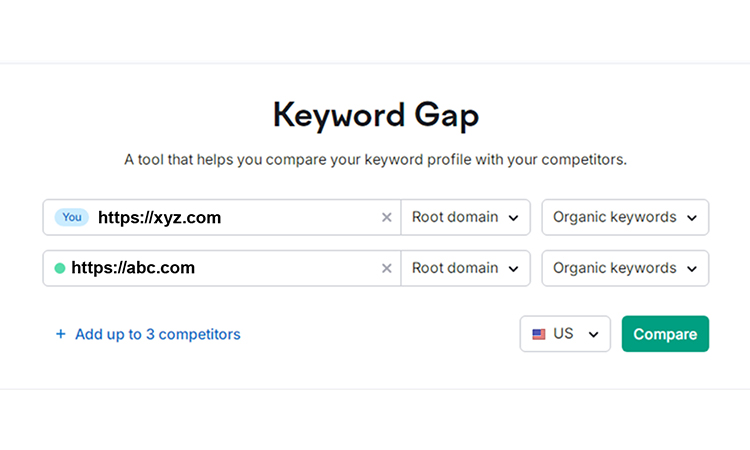
It’s important to implement filters for both transactional and commercial keywords. It helps you visualize those keywords that searchers use most frequently, especially when they plan to buy.
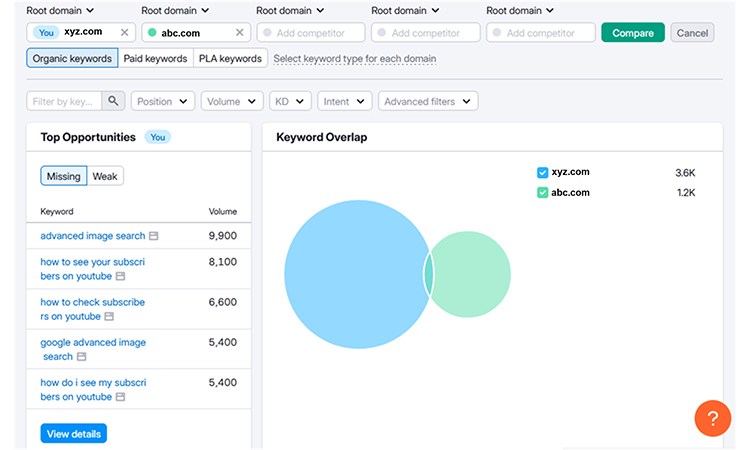
Above is the reason you get. The chart shows the overlapping keywords, which reflect common keywords that you and your competitors rank for. By going through an in-depth analysis, you will be able to find the best strategy for your website to rank for.
- Create a List of Seed Keywords
You need to take into account that seed keywords are an umbrella search term. In other words, these keywords are foundational terms related directly to the products you sell. They are mainly the starting point for eCommerce keyword research.
For instance, if you sell pet food, you need to consider the following keywords as your seed keywords;
- Pet food list
- Cat food
- Dog food
- Food for Puppies
You can use these keywords effectively to find the related keywords for your online store.
- Find Keyword Ideas
In this step, we will discuss the way you can use your seed keywords to generate the right keyword ideas.
Whether it’s Google Keyword Planner or SEMrush, you can choose the keyword research tools based on your convenience and enter your seed keywords.
For instance, we will choose here Keyword Magic Tool by SEMrush to generate keyword ideas. We will enter here our seed keyword ‘Pet Food’.
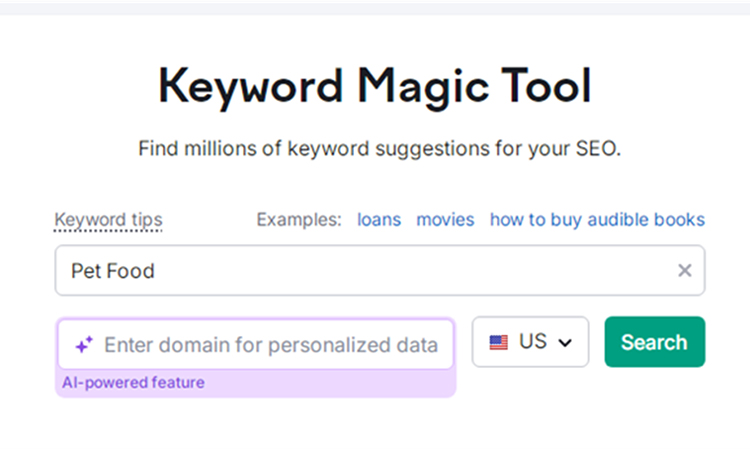
Once you hit the ‘Search’ button, you can get the following results;
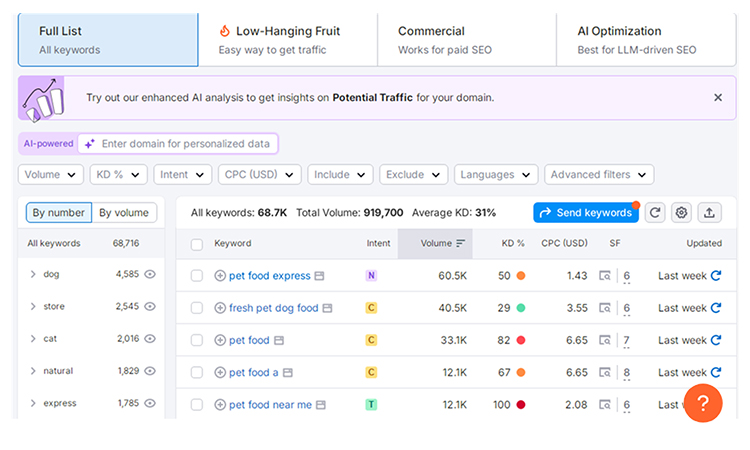
So, above is the list of keywords based on your ‘seed keywords’. Now, you need to focus on various important elements that are as follows;
- Volume
It reflects the number of searches a particular keyword claims for every month.
- Intent
When a user searches for a specific keyword, their intent is reflected in the things they want to find.
- Keyword Difficulty %(KD)
It reflects how difficult it will be for your website to rank in the top 10 on search engine results pages.
- Narrow Down your Keyword List by Using Filters
Once you get the final results from the keyword magic tool, you can use filters to narrow down the keyword list. It’s advisable to consider the following important factors to narrow down your keyword list;
- Relevance
The relevance of your keyword reflects how it’s related closely to the products you sell. The selection of relevant keywords lures many potential customers to your website. It’s vital to remove irrelevant keywords from results. You can discover irrelevant keyword groups in the left sidebar. To remove any irrelevant keyword, you can click on the ‘eye’ symbol.
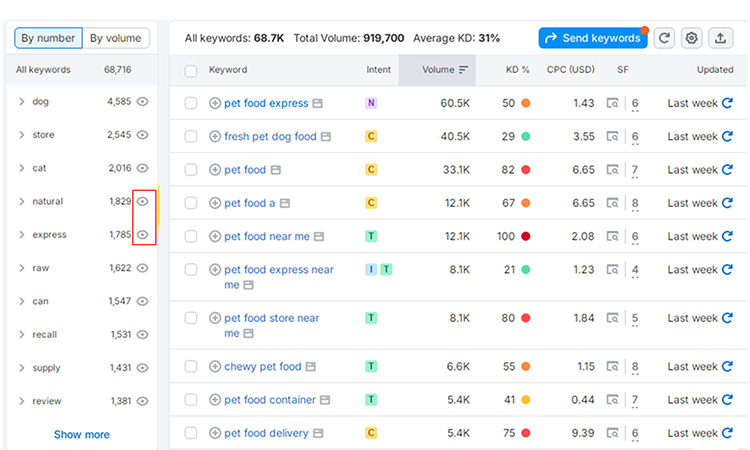
For instance, in the above results, we consider the above marked keywords to be irrelevant. You just need to click on the ‘eye’ symbol to remove them.
- Keyword Difficulty
Keyword difficulty reflects difficulties when it comes to ranking in SERP for a particular keyword. Once you get an idea of keyword difficulty, it helps you select various attainable keywords for your website.
KD metrics generally run from 0% to 100%. A higher value indicates tough competition and vice versa. Apart from this, the Keyword Magic Tool also offers a keyword difficulty score for every keyword. This metric works effectively in calculating in terms of how tough it is to rank your website.
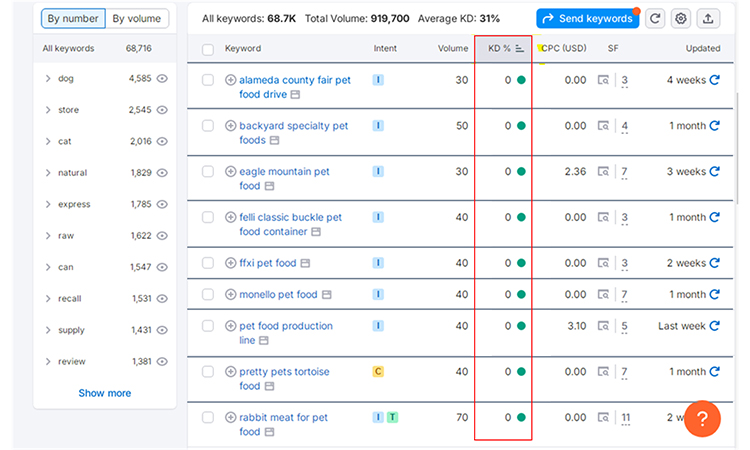
To find the relevant keywords to target, you need to tap KD%. It helps you go through a complete list of various options like ‘Easy’, ‘Hard’ ‘Very Hard’ ‘Difficult’, etc. Besides, you also get an option like ‘Custom Range’. You need to select those keywords that are less difficult.
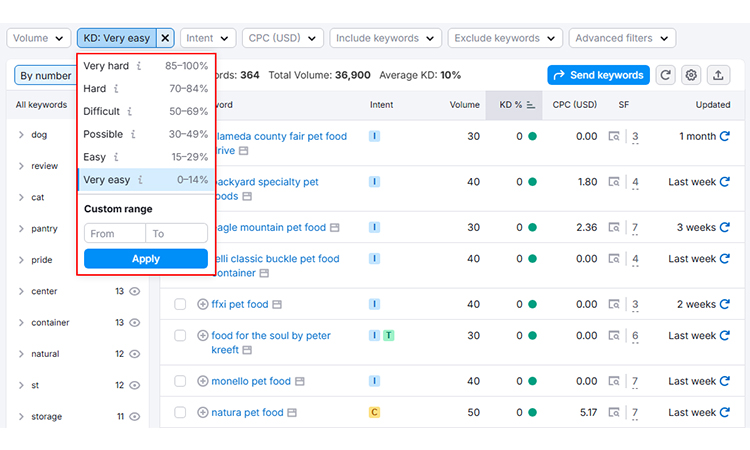
If you are picking relevant keywords for your new eCommerce store, you need to opt for keywords that come with or less than 50% KD.
- Search Intent
It helps you know why users search for particular terms or phrases. Once you are aware of search intent, it helps you get appropriate keywords for your online store. The following are the most important types of search intent;
- Informational
- Navigational
- Transactional
- Commercial
The above results by Keyword Magic Tool also display the search intent.
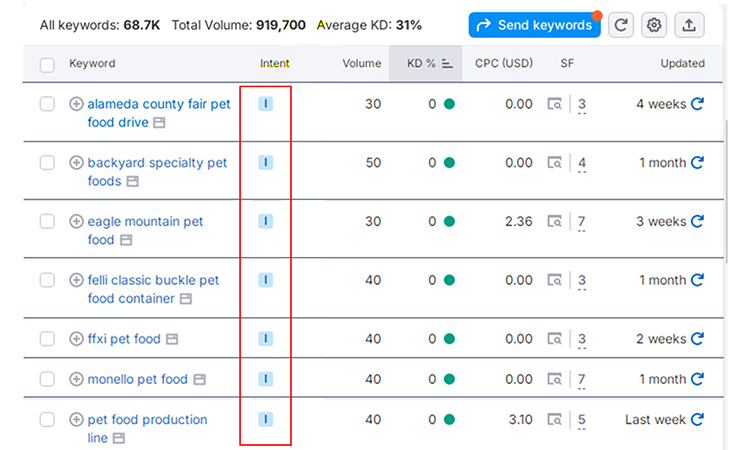
Now, you can filter both transactional and commercial keywords by tapping on ‘intent‘.
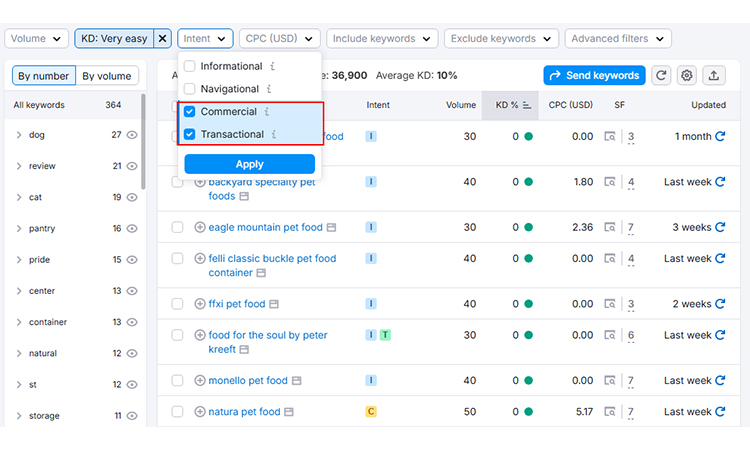
- Search Volume
Search volume reflects an estimation in terms of how often keyword users search. Getting ideas about an average monthly search volume enables you to know the amount of traffic you can boost your website.
You can easily go through ‘Volume’ and ‘Potential Traffic‘ to get an estimation of the traffic you can get when your website starts ranking with selected keywords.
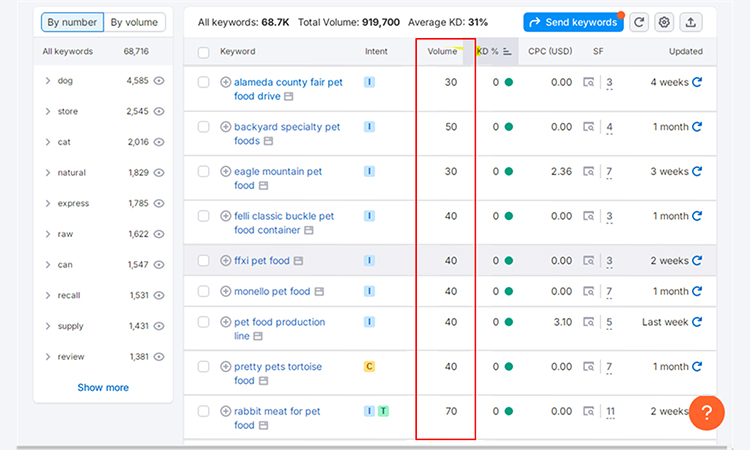
Use this keyword data to determine which keywords to prioritize and create content for.
It’s advisable to always select keywords that have high search volume according to your goals. You can see details on search volume as follows by tapping ‘Volume’ and selecting a search range. After this, you need to click ‘Apply’.
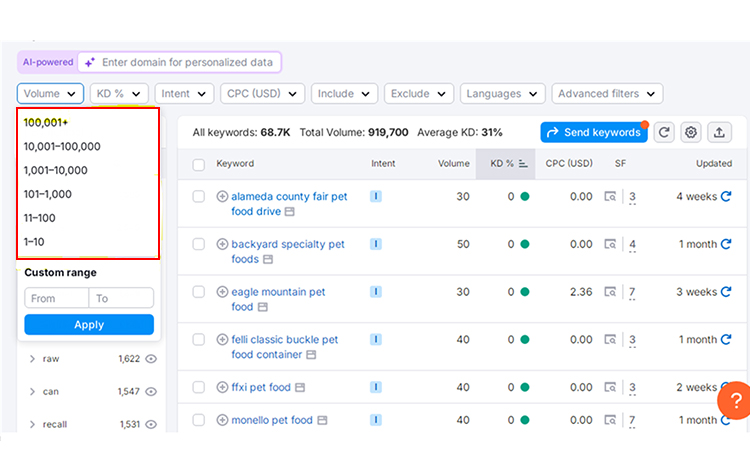
- Create your Final Keyword List
Now, it’s time to create a complete list of keywords you wish to target for your eCommerce business. You can go through every keyword suggestion that appears in your filtered list. You need to first identify keywords in the Keyword Magic Search results. After this, you need to click on the ‘Send Keywords’
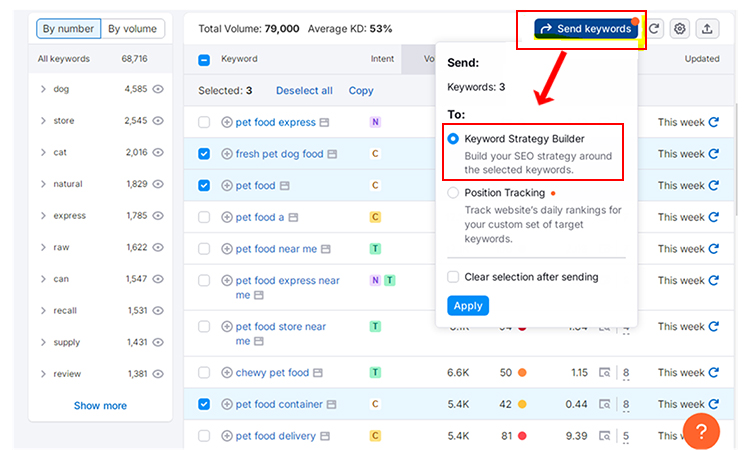
In the above option, you need to click on ‘Keyword Strategy Builder‘ and then hit the ‘Apply’ button. It gives you an option to ‘create a new empty list’.
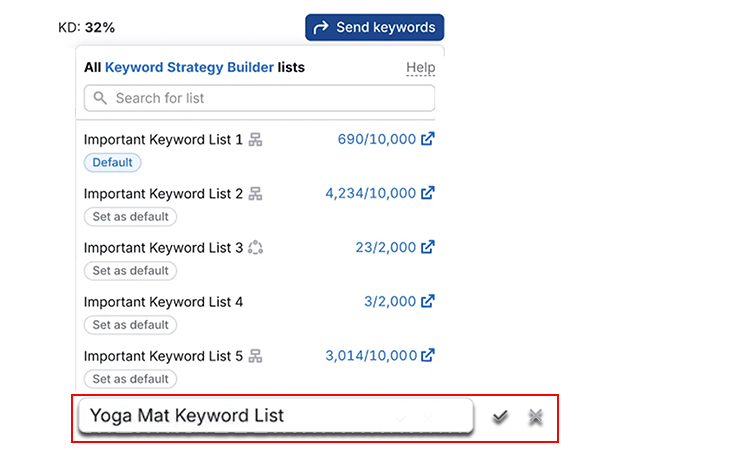
You just need to click on the ‘Right Tick’ to get a complete keyword list you can target for your eCommerce website.
- Choose Keywords that Boost Sales
You need to now explore those keywords that have a direct impact on increasing sales and conversion potential. It reflects that you recognize those keywords that have a bigger impact on earning more revenue.
It’s vital to access keyword conversion data by leveraging the eCommerce Keyword Analytics tool. You can use this keyword tool to enter your main keyword in the search bar, select the location you target, and finally hit the button ‘Search’.
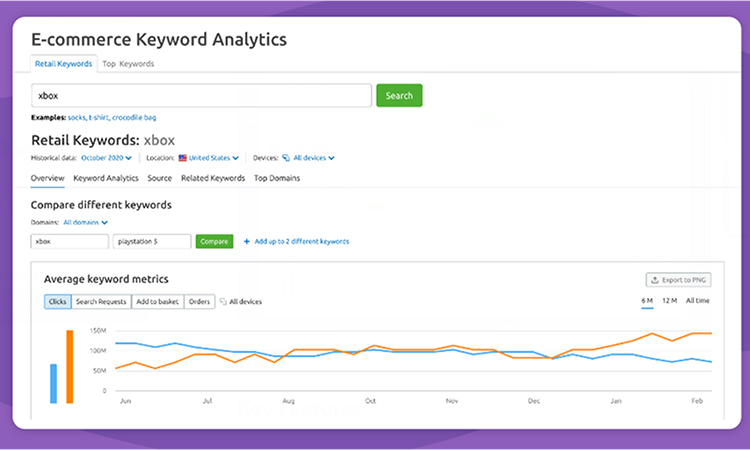
The result will appear like the above. It gives you complete details related to data reflecting how users complete their browser journey for many top-performing and popular keywords for eCommerce websites. Once you click on ‘Conversions’, it allows you to visualize average conversions across many reputed retailers.

You need to analyze the ‘Top online retailers keywords’ widget to compare various metrics such as clicks and orders across multiple eCommerce sites.
Now, you can repeat the same process with every keyword to get the overall revenue for every keyword.
The most important way of estimating revenue potential is to multiply the traffic potential of keywords. You can focus on creating several pages for keywords with an improved revenue potential.
- Optimize your Websites with Keywords
You need to place keywords across your website with the right strategy. Make sure you place relevant keywords across every page of your website to provide search engines with great content. It maximizes your chance to boost ranking possibility in search results. Following are the most important areas you need to place your keywords;
- You need to use relevant keywords in many important places, be it descriptions, product titles, or specifications. Doing this allows you to make your product pages more relevant and meaningful.
- The next thing you need to do is to optimize both descriptions and category names widely. You can use various high-intent keywords for organizing your website and thus enhance navigation.
- You need to create descriptive URLs that include the right keywords for every page.
- It’s essential to add relevant keywords to subheadings and H1 tags to outline clearly to focus on every page.
- You need to use appropriate keywords in meta descriptions and title tags to make your website pages more clickable in search results.
- The next important thing you can do is to optimize alt text and image file names with keywords for enhancing accessibility and visibility.
- You need to implement keywords naturally in buying guides or blog posts to entice users who research their purchases.
- It’s also advisable to leverage keyword-rich phrases in internal links and navigation menus to offer proper guidance to users and improve search engine optimization.
- If you plan to write a content like blog post or article, you need to get the help of a writing assistant tool. It helps you implement keywords into your texts. Be it tone of voice, readability, or originality, it lets you do everything while checking your content.
- Once you mention keywords in strategic locations, it helps you enhance the ranking of your eCommerce website. Besides, it also helps you offer a smooth user experience.
- It’s advisable to analyze your website’s performance and make necessary adjustments as per your requirements. It helps you update with the changing search trends.
- Measures Results
It’s important to keep an eye on the search results to get a complete understanding of many specific areas that require more focus. It helps you adjust your strategy accordingly and thus make the right decision. You need to consider the following important factors while measuring results;
- Organic Traffic
Going through an in-depth keyword analysis helps you get details about those keywords that contribute effectively to increasing organic traffic to your website. It also helps you know products that have high or less demand.
- Keyword Ranking
You need to check every keyword regularly on SERPs. The number from 1 to 10 reflects that your web pages rank on the first page of SERPs. Meanwhile, if your pages rank between 1 to 3, it reflects a higher visibility. You need to keep an eye on the fluctuation to visualize whether keyword optimization is helpful or any algorithm changes lead dips.
- Click-through rate (CTR)
CTR determines the number of searchers who click through your website after going through your website in SERPs. An improved CTR indicates attractive descriptions, meta titles etc. attached based on user intent. Meanwhile, a poor CTR reflects an issue between on-page content and keywords.
Conversion rate from organic search
It helps you know a number of organic visitors’ purchases, which is highly important for ROI. Even if you find any keywords that generate huge traffic, low conversions reflect a mismatched intent. It’s important to use your Google Analytics to visualize those search terms that have the immense capability of bringing a huge volume of paying customers.
- Tools for Measuring Results
To analyze accurate results, you can leverage tools like Position Tracking, and Google Search Console. These tools help you analyze those keywords and also their search results positions. It helps you discover number of pages that rank better. Apart from this, it also helps you keep an eye on those pages that need to work on.
With the use of a Google search console, you will be able to know the exact ranking position of your keywords in the search results. For new pages, you need to provide several months to adapt to the search results before they make any changes.
After this, you need to search for keywords that don’t rank on the first page of search results. With the help of a search engine writing assistant, you can optimize your low-ranking pages and thus boost their rankings.
Wrap Up
Keyword research is one of the important factors to ensure success of any online store. Without using the relevant keywords in your eCommerce store optimization, you will not be able to make an effective SEO strategy. The most important thing you need to focus on while performing keyword research is your search intent.
Understanding search intent allows you to leverage proper keyword research tools and align your keyword strategies across multiple platforms consistently. It indeed helps you boost online visibility, entice more qualified customers, and increase sales. Using long-tail keywords always work and provide the best results.
Additional Resources:
- eCommerce Marketing: Ultimate Guide for Maximizing Conversions
- SEO for eCommerce: How to Boost Your Store’s Online Visibility?

